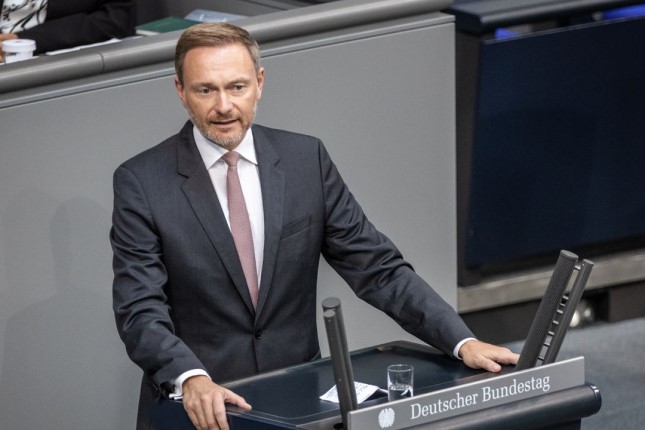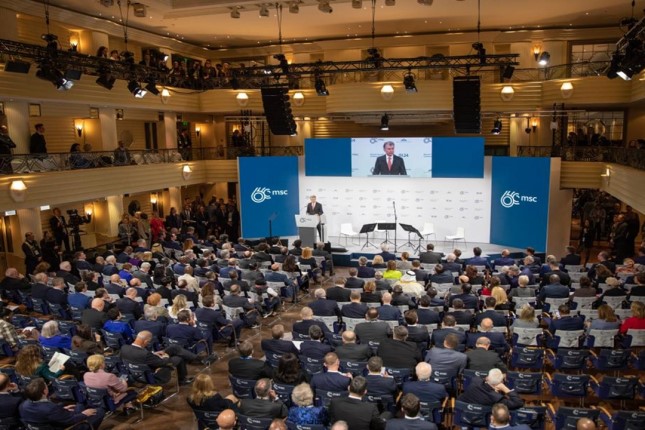It plans record spending for waging war and for rearmament, and it declares war on the working class by slashing social spending.
If the government coalition has its way, Germany will spend €85.5 billion for military purposes next year, the highest sum since the end of the Second World War. That is more than the military expenditure of any other European country, including Russia. Germany is thus to be built up as the leading military power in Europe.
The draft budget of the Defence Ministry only shows expenditure of €51.8 billion, 1.7 billion more than in the current year. But on top of that, there are €19.2 billion from the Bundeswehr’s “Special Fund,” as well as other expenditures hidden in other budgets. To Ukraine alone, Lindner has promised €5 billion in military aid every year until 2027. Together, the military expenditure thus amounts to €85.5 billion euros—the sum that Germany declares to NATO.
The record military spending is offset by cuts in social spending. All departments, except for the Defence Ministry, had to cut planned expenditure. With a total of €445.7 billion, about 30 billion less is planned for the 2024 federal budget than for this year’s budget.
Lindner and the coalition of the Social Democrats (SPD), Greens and FDP are insisting on complying with the so-called “debt brake.” At €16.6 billion, new debt in 2024 is to be only one-third of this year’s level. Nevertheless, the federal government will transfer €37 billion to the banks in interest because of rising interest rates. That is twice as much as the entire budget of the Ministry of Education and Research.
Some of the cuts in social spending are drastic. This is most obvious in the health budget, which will drop from €24.5 billion this year to €16.2 billion next year. In 2022, it had amounted to €64.4 billion. This 75 percent cut is partly due to the fact that the government has almost completely cut funding for monitoring and combating COVID-19, even though the pandemic continues to spread and generate ever new variants. There is also hardly any money for research and cures for Long Covid, even though hundreds of thousands suffer from it.
For the hospitals and their employees, the cut in the health budget has devastating consequences. Many will go bankrupt. Work stress, which is already almost unbearable, will get worse as more and more leave the profession because of the miserable pay.
Child poverty will also continue to rise, despite the Federal Statistical Office recording that about a quarter of all children and young people in Germany are already at risk of poverty or social exclusion. Nothing is left of the basic child allowance that Family Minister Lisa Paus (Greens) and the finance minister argued about for weeks.
Of the €2.4 billion additional the government finally agreed on, not one additional cent will reach children. It is just enough to finance the added administrative costs and the planned increase in various benefits, which are now being merged into the basic child allowance.
The FDP also made it clear that this was the last “social reform” it had agreed to. From now on, there should be no more social reforms that consume tax money or create new debt.
Many other cuts, which are less significant in terms of numbers, have far-reaching effects. Several social benefits that used to make life a little easier for low-income families are being almost completely cut. Funds for the Mothers’ Convalescence Association and family holiday centres are each being reduced by 93 percent, for youth education and youth meeting centres by 77 percent, for free youth welfare provisions by 19 percent, for housing benefit by 16 percent, and for student grants by 24 percent.
To finance the war budget, even more extensive attacks will be prepared in the coming years. By far the largest item in the federal budget is the Ministry of Labour and Social Affairs, with €172 billion. Of this, €127 billion is earmarked to support pensions, an expenditure that is simply unacceptable from the point of view of the ruling class.
Pensions were already massively cut 20 years ago as part of the Schröder/Fischer government’s “Agenda 2010” regressive welfare reforms. Pension levels were lowered, and pensioners burdened with additional tax and social security contributions. Angela Merkel’s first government then gradually raised the retirement age from 65 to 67, which effectively amounted to a further reduction in pensions.
As a result of Agenda 2010, wage levels and thus contributions to the pension fund fell and the government kept shifting new burdens onto it, but the state subsidy to the pension fund nevertheless increased. Representatives of the ruling class are already demanding that the orgy of cuts in pensions, healthcare and social benefits be intensified.
Christian Democratic Union (CDU) budget expert Mathias Middelberg told the Reuters news agency: “The savings in the 2024 draft budget are minimal. In many cases, there are only internal transfers at the expense of the pension or care funds.” Above all, he argued, the welfare budget could be reduced. Four million recipients of the citizen’s income are able to work, but do not work, he said.
The Federal Court of Auditors, a federal agency that is not under the control of the government, also sharply attacked the draft budget. It accused the government of hiding actual new debt in subsidiary budgets, such as the €100 billion special fund for the Bundeswehr. In the years 2020 to 2022 alone, he said, a total of around €400 billion had been removed from the limiting function of the debt brake.
Now the federal government would face enormous costs, the agency said. From 2028 onwards, at least 11 billion and from 2031 onwards at least 17 billion would be due annually to repay this debt. In addition, the repayment of loans for the European Union’s reconstruction fund would fall due from 2028.
“The Federal Court of Auditors cannot yet identify any strategy or concrete measures on how to ensure the sustainability of the federal budget in the medium and long term,” the report to the Bundestag’s budget committee states.
The €400 billion that the Federal Court of Auditors speaks of flowed almost entirely into the accounts of large corporations and banks, in addition to paying for rearmament. They received billions in state money so that profits continued to percolate during the pandemic, the Ukraine war and the inflation triggered by the war.
While the trade unions have concluded wage agreements far below the inflation rate, and real wages are falling, share prices are moving from record to record. The 40 companies listed on Germany’s Dax index reported new records in turnover and profit for the year 2022. Their earnings before interest and taxes amounted to €171 billion.
But these funds are taboo for the government. The same applies to the vast fortunes amassed by some billionaires--according to Forbes, the 10 richest Germans together were worth over $200 billion in 2023. Besides adherence to the debt brake, the mantra of the federal government’s budget policy is: “No tax increases.” Profits are taxed only moderately and wealth not at all.
All parties currently sitting in the Bundestag and the state parliaments support this course—including the Left Party, which voices criticisms here and there, but pursues the same policy as soon as it sits in government, as it does in a number of federal states.
Lindner’s war budget is the prelude to fierce class confrontations...
Photo: Finance Minister Christian Lindner during a speech in the Bundestag © DBT / Leon Kügeler / photothek.
Source: World Socialist Web Site.
































